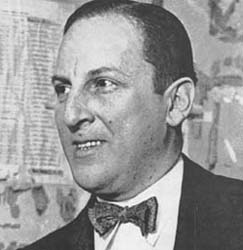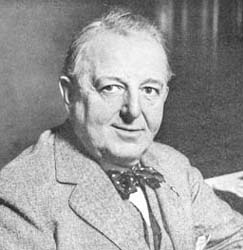|
The Big Money Behind the Fix: Arnold Rothstein |
President of the White Sox: Charles Comiskey |
|
Who is he anyhow, an actor?" Arnold Rothstein's attorney, William Fallon, memorably described his client: "Arnold Rothstein is a man who waits in doorways..a mouse, waiting in the doorway for his cheese." Eliot Asinof, in Eight Men Out, says Rothstein "was referred to as a sportsman by the newspapers, as a professional gambler by the Broadway crowd, and as a hoodlum by his father. The truth was, he was all of these things, though he saw himself merely as a man who wanted money." Rothstein was born in 1882 in New York. His involvement in the world of gambling began at an early age. A poor student (except in arithmetic), Rothstein lost interest in school when he was 16 and decided to drop out. He worked in a clothing factory and then as a traveling salesman for awhile before deciding to hang out in pool halls. At age 20, he went to work for himself booking bets on horse races, baseball games, elections and prize fights. He made loans at 25% interest rates. When his customers didn't pay back the loans, he called on a moronic brute to get it back for him. Rothstein received his nickname, “The Big Bankroll,” because he always insisted on carrying a huge bankroll of $100 bills. He wanted to be able to immediately finance any deals he made. In 1909, he married an actress named Carolyn Greene. 1914 was the year that Rothstein moved into the business of bookmaking. He owned a discount house for wagering and this is where he made his fortune. Rothstein once stated that he was willing to bet on anything but the weather--the weather was the only thing he could not fix. Rothstein’s role in the 1919 World Series scandal was behind the scenes as a financial backer. His name, reputation and wealth were used to help influence the ballplayers. Rothstein was approached by two separate groups who wanted him to provide the funds to pay off the eight White Sox players. He chose to work with Joseph “Sport” Sullivan because he had a proven reputation in the gambling circle. Most believe that Rothstein placed as over $270,000 in bets on the Cincinnati Reds to win the world series that year. When called to testify before the grand jury, Rothstein denied all involvement with the scandal. He shifted the blame to his former associate Abe Attell. Rothstein was eventually exonerated of any wrongdoing. In September of 1921 Rothstein announced to the world that he was through with gambling. This was an attempt to regain the anonymity he had lost because of his ties to the Black Sox scandal. He ceased all direct ownership of his gambling houses. He did not, however, move away from the world of gambling altogether. Following this move, Rothstein became involved in drug dealing, bootlegging and labor racketeering. Rothstein was shot in the abdomen during a poker game at a New York hotel. He died on November 6, 1928, at the age of 46. The principal suspect, a gambler named George McManus, was never prosecuted. Rothstein, on his deathbed, refused to name his assailant. After his death, an FBI investigation of Rothstein's records showed that he had paid $53,000 to the Sport Sullivan's attorney to acquire four affidavits signed by Sullivan, Attell, and two other gamblers that had named Rothstein as the man behind the 1919 World Series fix. Rothstein was never been convicted of breaking any law during his lifetime. |
Charles Comiskey was born on August 15, 1859. At age 17 his destiny in life was redirected. While driving a brick wagon in Chicago he saw a baseball game in progress. The pitcher was performing so badly that Comiskey stopped his wagon and went to take his place. It was the beginning of his long career in the sport of baseball. In 1882, Comiskey began to play professional baseball with the St.Louis Browns. He played six years for the team and was a playing manager for five of them. He went on to become the owner of a Sioux City franchise in the Western League, which he soon moved to St. Paul. In 1901, the Western League became the American League and Comiskey became owner of a Chicago team he called the White Stockings. It was later renamed the White Sox so as to fit better into newspaper headlines. On July 1, 1910 Chicago opened Comiskey Park, which was to become the home of the White Sox for 81 years. Charles Comiskey received a lot of the blame for the 1919 World Series scandal. Many baseball historians contend that his treatment of the players led Gandil and then others to take desperate measures to earn what they figured was their due. Comiskey was a tightwad, but just one among many tightwad owners. He had promised his team a bonus if they won the 1917 pennant, but all they received for their victory was a case of cheap champagne. In 1918, attendance at baseball games across the country dropped because of World War I. Owners cut players salaries the next year as a result. When attendance in Chicago actually went up, Comiskey refused to bring salaries back to their previous level. The White Sox had the filthiest uniforms in the league largely, it was said, because Comiskey reduced the number of launderings to save money. Comiskey had some of the best players in the country on his team, but arguably paid them less than what players of comparable talent were earning elsewhere. During this era, there was nothing the players could do about their grievances. Free agency did not exist in 1919. All baseball contracts contained a reserve clause. A player had to accept what his team offered or not play at all. No other team would be able to touch them after that. The player would have to find a different line of work. Following the World Series of 1919 Comiskey offered a reward of $20,000 to anyone who could provide information about the rumored fix. He placed an ad in newspapers across the country. Several people came forward to provide information, including a letter received from Joe Jackson written by his wife, but the reward was never paid. Comiskey was called as a witness at the trial of the eight White Sox players. He revealed that he had heard possible rumors of the fix during the series. Comiskey was also questioned about the finances of the White Sox team during the years surrounding the scandal. He could not remember exact figures. The defense hit a nerve with The White Sox players were represented at trial by some of the most expensive lawyers in the area. However, none of the players had enough money to afford their services. Comiskey, it turned out, paid the attorney fees. Judge Kenesaw Mountain Landis banned the eight former White Sox players from playing professional baseball for life after their acquittal. Comiskey publicly proclaimed his full support for Landis’s decision. Yet, this destroyed his top ranked baseball team and their dominance of the league soon ended. Charles Comiskey had two nicknames in his lifetime. Some called him “Old Roman” because of his physical makeup and personal traits. He was known by his friends simply as “Commy.” Comiskey died in 1931 at the age of 72 in his Wisconsin summer home. |

